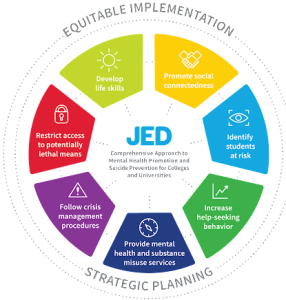Emotional Wellness
At Binghamton University, we prioritize the emotional well-being of our students, faculty, and staff as a cornerstone of academic success and personal growth. We understand that navigating university life can be both exhilarating and challenging, and we are dedicated to providing comprehensive support and resources to promote emotional wellness.
Understanding Emotional Wellness
Emotional wellness goes beyond the absence of mental illness; it involves actively cultivating a positive mindset and resilience in the face of challenges. Key elements include:
- Positive Psychology: We embrace the principles of positive psychology, focusing on strengths, resilience, and the promotion of well-being. Our programs emphasize building positive emotions, engagement, relationships, meaning, and recognizing accomplishments.
- JED Foundation Campus: Binghamton University is proud alum of the JED Foundation's comprehensive program
to address emotional health and suicide prevention among college students.

This framework emphasizes:
- Campus-wide Mental Health Promotion: We integrate mental health into all aspects of campus life, fostering a culture of openness, support, and mental health literacy.
- Early Identification and Intervention: Our programs include early identification initiatives to recognize students who may be struggling and provide timely support and resources.
- Crisis Management and Suicide Prevention: We are committed to proactive suicide prevention efforts, including training staff and students in recognizing warning signs and responding effectively.
Our Commitment to Emotional Wellness
Binghamton University offers a range of resources and programs to support emotional wellness:
- University Counseling Center (UCC): Our Counseling Center provides confidential support through individual counseling sessions, group therapy, and workshops. Our counselors are trained in evidence-based practices to address a variety of concerns, from stress and anxiety to depression and relationship issues.
- CARE Team: Housed within the Dean of Students Office, the CARE Team is the University’s case management Office. Case managers help students identify problems, find solutions to complex situations and support students as they navigate systems. Case Management Services are non-clinical and non-emergent. You can submit a CARE Team referral online.
- Decker Student Health Services Center - Psychiatry: provides evidence-based psychiatric consultation and treatment, which recognizes and promotes the importance of students being connected with counseling services.
- Peer Education & Support Programs: Through peer education and support programs, students can connect with trained peers
who offer psycho-educational programs, empathetic support and referral to campus resources.
- Healthy Campus Peer Agents
- SEEK
- Mindset Mentors
- Educational Workshops: Throughout the year, we offer workshops and seminars on topics such as stress management, mindfulness, resilience-building, and emotional intelligence.
Creating a Supportive Campus Culture
We believe in creating a supportive environment where every member of our community feels valued and cared for. Our campus-wide initiatives include:
- Awareness Campaigns: We organize events and campaigns to raise awareness about mental health, reduce stigma, and promote help-seeking behaviors.
- Student Organizations: Join student-led organizations focused on mental health advocacy, peer support, and wellness promotion.
- Training and Education: We provide training opportunities for faculty, staff, and students on mental health awareness, crisis intervention, and suicide prevention strategies.
Get Involved
You can make a difference in promoting emotional wellness at Binghamton University:
- Collaborate with B-Healthy: Contribute your time and skills to support wellness services, organize events, or participate in peer support programs.
- Join the Conversation: Attend campus events, forums, and discussions on emotional wellness and mental health topics.
- Schedule a Workshop: Review our course offerings and invite B-Healthy into your class, department or student organization meeting and show your team you care about their wellness goals.
Contact Us
Your emotional wellness is important to us. For support, information, or to get involved, please contact B-Healthy: Healthy Campus Initiative or visit our online resources.
At Binghamton University, we are committed to fostering a community where emotional wellness is prioritized, stigma is reduced, and every member has the resources they need to thrive academically and personally.